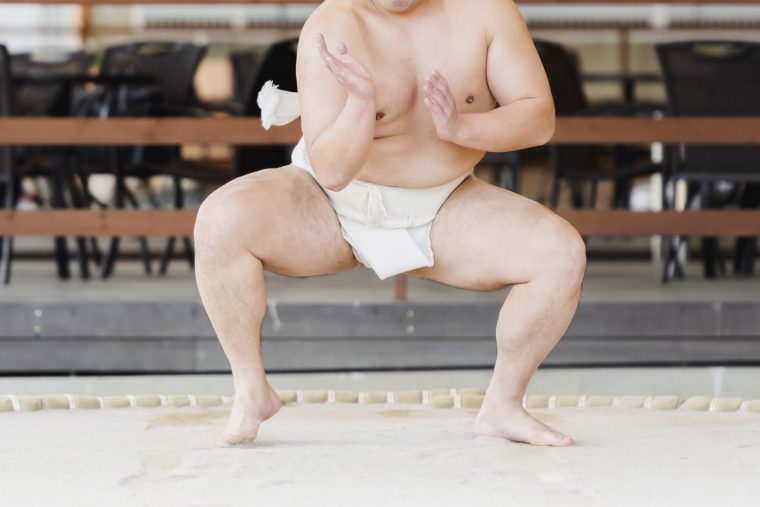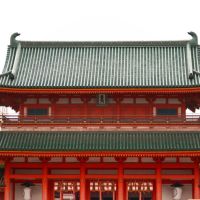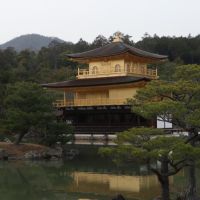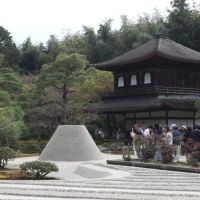How to get Sumo tickets and schedule in 2018
Masaya Osada
Latest posts by Masaya Osada (see all)
Sumo, the National sport in Japan, has been loved by Japanese people since ancient times. Even today, speaking of Sumo, most Japanese think that traditional Japanese atmosphere remains. Throughout Sumo, you can appreciate traditional Japanese culture, unique experiences around the venue of the Sumo tournaments, and dynamical wrestlers’ matches as well as local people. During your one day in Japan, would you like to learn and experience Sumo culture? If you would like to, you might be worried about how to get tickets, however. Here are the information on how to get tickets to enjoy the Sumo tournament day.
Contents
The History of Sumo
|Origin of Sumo
According to Japanese mythology, Sumo originated over 2,000 years ago. In front of Japan’s Shinto (Shinto is the Japan’s indigenous religion ) deities, people began to Sumo matches to pray for rich harvest or to predict whether the year’s harvest would be good.
|Sumo in medieval ages
Sumo matches were held to raise money to construct bridges, shrines or temples. At that time, professional Sumo wrestlers were born. Present Sumo ranking system was established in the Edo period (1603-1867). The woodblock portraits of Yokozuna ( grand champion ) or woodblock printings for Sumo matches were popular among commoners.
|Present Sumo
Today Sumo is regarded as the National sport in Japan. The Grand Sumo Tournaments (Oosumo) are held six times per year and still popular among Japanese people from the Emperor to commoners. During the Grand Tournament days, a lot of people turn on the TV to watch Sumo matches.
In addition to the exhilarating Sumo matches, visitors can immerse themselves in the profound tradition of the Hochoshiki Knife Ceremony. This elegant ritual showcases the artistry of Japanese knife-making and the cultural reverence for the tools that play a vital role in Japanese cuisine. Experiencing the ceremony adds another layer of cultural depth to your visit, celebrating Japan’s rich heritage of craftsmanship and ritualistic respect for everyday objects.
https://www.hochoshiki-knifeceremony.com/
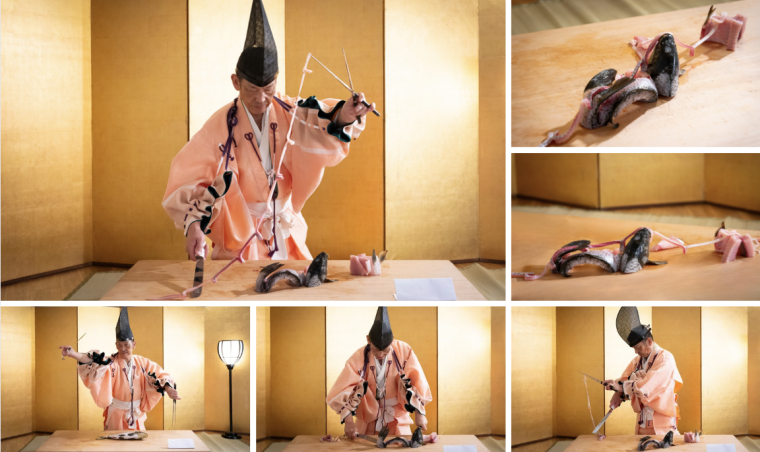
A sacred place for Japanese food, a treasure house of ingredients, Minami-Boso Takaya Shrine Kitchen knife ceremony "Ryumon-no-Koi" long story: edited by Minamiboso City Tourism Association Channel
The rules of Sumo
|Sumo wrestlers Style
One Sumo match is performed, two persons. Sumo wrestlers tie up topknots on their hairs. Only professional Sumo wrestlers tie up special topknots like a ginkgo leaf shape before matches. And all wrestlers wear only a loincloth. This means they perform fairly without using any weapons in front of deities.
|Before the match
When two wrestlers’ ring names at a next match are announced, two wrestlers go up to the ring called Dohyo. They take a few minutes for an initial charge called Tachi-ai. It is extremely important in gaining the advantage and momentum over your opponent.
|Win or lose
After the initial charge, a judgeman on the ring says, “it’s time to play,” and then they begin to play. A wrestler loses a match when any part of his body other than the souls of his feet touches the ring or when he is pushed or thrown outside of the ring.
How to watch Sumo tournaments
|Yearly Grand Tournament schedule
Every year Sumo tournaments are held 6 times such as January, March, May, July, September, and November. One tournament is held 15 days, starts the second Sunday and ends the fourth Sunday respectively. Sumo tournaments are held at Ryogoku Kokugikan (Ryogoku National Sports hall) in Ryogoku, Tokyo in January, May, and September. March is Osaka, July is Nagoya and November is Fukuoka. To watch the tournaments at venues, you are required to get tickets in advance. As Sumo is a popular sport in Japan, getting earlier would be better. Here is the detail of getting tickets below.
How to get tickets from the Official page
|Check the Grand Tournament schedule in 2018
According to Nippon Sumo Kyokai ( National Sumo Association ), the tournament is scheduled below. (http://sumo.pia.jp/en/ )
2018 Grand Tournament Schedule
|
Tournament |
Venue |
City |
Advanced tickets are sold from |
First day |
Final day |
|
The January tournament |
Kokugikan |
Tokyo |
December 2, 2017 |
January 14, 2018 |
January 28, 2018 |
|
The March Tournament |
EDION Arena Osaka |
Osaka |
February 5, 2017 |
March 12, 2017 |
March 26, 2017 |
|
The May Tournament |
Kokugikan |
Tokyo |
April 8, 2017 |
May 14, 2017 |
May 28, 2017 |
|
The July Tournament |
Aichi Prefectural Gymnasium |
Nagoya |
May 25, 2017 |
July 9, 2017 |
July 23, 2017 |
|
The September Tournament |
Kokugikan |
Tokyo |
August 5, 2017 |
September 10, 2017 |
September 24, 2017 |
|
The November Tournament |
Fukuoka Kokusai Center |
Fukuoka |
October 7, 2017 |
November 12, 2017 |
November 26, 2017 |
|Check available seats
The official page shows to get two types of seats such as a Japanese style Box seat ( Masu seat ) located in relatively front and an arena seat (chair seat ) located in the backside.
■Japanese style Box seats
At a Japanese style Box ( Masu seat ), you sit on the floor. One Box accommodates maximum 4 people, normally. In Kokugikan, Tokyo, Boxes are located on the first floor. Price is from 38,000 yen ( tax included and service charge excluded ) per a Box. ( Prices will vary slightly between venues. ) You can experience viewing dynamic matches closer from a Box Seat.
■ Arena seats
Arena seats are just like the stadium seating found in your country. In Kokugikan, Tokyo, arena seats are located on the second floor. The price is 3,800 yen ( tax included and service charge excluded ) per one person. You might feel more comfortable than box seats as 4 people are packed in a box.
|Book on the Official page
■Check an available date
Booking earlier would be better to get tickets.
■Click a seat type
You can pick up one of three types.
/ Box seats for 4 guests
/ Special box seats just for two guests
/ Arena seats
Caution: Box seats for 4 guests
Each ticket is valid for 4 guests. Box Seats ( You’ll be given an area of the floor and four cushions to sit on ) are sold for 4 guests. Even though your group consists of less than 4 people, if you choose the box seats for 4 people, you are required to pay the face value of the ticket to order one Box Seats.
■Payment
In the English site, only credit card payment is accepted. You are required to pay a seat charge and SERVICE CHARGE. ( Box seats are up to 4,000 yen per one box, and Arena seats are 1000 yen per a ticket. ) When you succeed to get tickets, you can receive them in the counter at the venue on your booking day. Any child 4 years of age and older will require a ticket to enter.
Once you’ve decided on the date, you want to go and the type of ticket you want, log on to either site to place your order. It’s so simple!
|How to get tickets for today
You might want to watch the Sumo Tournament suddenly during your stay in Japan, or you might miss getting the ticket before arriving in Japan. The Sumo Association generously sells chair seats for today. It is said chair seats are sold around 300 – 350. Usually, seats are back rows.
The Sumo association says that tickets sell from 7:45 AM for today at the tournament venue. As Sumo is one of the popular sport in Japan, a lot of people make a line to get tickets VERY EARLY in the morning. You might get up very early as well as visiting Tsukiji Market. Until around 7:00 AM, the Sumo association hands out numbered tickets. You are required to get one numbered ticket per one seat. Based on numbered tickets, you can get seat tickets from around 7:45 AM.
Payment is cash only. It costs 2,100 yen per person and 200 yen for one child ( from the age of 4 to 15 ) If you reach at the venue around 7:30 AM, you would miss getting tickets.
How to get unofficial sites or ticket shops
If you miss the tickets in advance, let’s try another sites or ticket shops. If you are lucky, you might get good seats. Although some people get tickets, they are sometimes required to release them due to various reasons. The price might higher than official sites, but when you won’t get up early to purchase tickets for today, or you would like to get better seats, that would be a helpful way. Here is the tips for tickets.
|Via Internet
Via Internet is easier for you as some English sites sell Sumo Tournament tickets.
■Stubhub
Stubhub treats various kinds of the Sumo Tournament tickets. The site is very easy to understand to get tickets. Even the official site says ‘ sold out,’ stubhub still offers tickets. And also Stubhub can offer Ringside seat tickets which we cannot get via the official site.
■BUYSUMOTICKETS.COM
BUYSUMOTICKETS.COM also offers Sumo tickets and delivers to your hotel in Japan if you want. The motto of the company is a fast response. Sometimes, out of the grand Tournament days, wrestlers have a special sumo match events here and there in Japan. Of course, you can enjoy Sumo games as well as the Grand Tournaments. The company also treats such tickets. If you have a chance to visit the place where special events are held, let’s try to get such tickets.
|Via ticket shops
It might be tough for Japanese speaking beginner. However, if you visit shops, you might have a chance to get tickets, in particular, near Kokugikan. Even if you speak broken Japanese, you would get tickets if shop keeps them.
■Tickety Ryogoku Ten (チケッティ両国店)
Photo from Tickety
Tickety Ryogoku Ten treats Sumo tournament tickets. It has a Web page, however, as it can be written in Japanese language only, it would be tough to understand to get tickets. Tickety Ryogoku Ten is a brick and mortar shop, so you can get there.
Business hours: 10:00~19:30
Location: In front of east gate of JR Ryogoku Station (nearest station of Kokugikan)
No holidays
■Via personal deal on the Web
Ticket Ryutsu Center (チケット流通センター) is the website which treats private deals. If someone who wants to sell tickets shows on the site with price, another person who wants to get tickets buy them. However, the page is written in Japanese language only. So it would be tough to get tickets. If you have a native Japanese speaker friend, it would be better to ask them to help get tickets. Even if tickets are sold out on the official site, sometimes good tickets would be up on the web.
How to enjoy a Sumo tournament
| One Tournament day schedule
From around 8:30 AM to 6:00 PM
Sumo matches play from lower ranked wrestlers to higher. In the morning when trainee Sumo wrestlers’ matches are held, less guests can be seen.
Usually, most guests come to the venue around 3:30 PM when the highest class ( Makuuchi ) matches are held. Before matches, all Makuuhi wrestlers who wear decorative aprons called Kesho-mawashi show on the ring-entering ceremony ( Dohyo Iri ).
Then Yokozuna ( Grand Champion ) appears on the ring and conducts the Special ring entering ceremony with two following wrestlers, which is one of the major highlights of the day. Only Yokozuna were allowed to conduct the special ceremony.
Then Makuuchi matches start. The last game around 5:50 PM is the day’s highlight as Yokozuna ( Grand Champion ) fights to an opponent. And a long day ends at 6:00 PM punctually.
|Special wrestler’s meals trial
■What is wrestler’s meal ( Chanko )
Wrestles meal is called Chanko. Chanko is a hotpot meal and ingredients are meat, fish, vegetables, and mushrooms. All ingredients are boiled with a special soup. Its taste depends on seasons, tournament venues and so on.
Chanko is nutritious rich and regarded as a healthy food among Japanese. Almost every day after wrestler’s morning training wrestles cook and eat them. Eating chanko is one of the important training for wrestlers due to building their bodies.
■Chanko Trial at Kokugikan
In the basement floor of Kokugikan, during the Grand Sumo Tournament days, Chanko meals are served with 250 yen until 4: 00 PM. Its tastes are different every day. Would you like to try Chanko before Makuuchi matches?
■Viewing with food and drinks
Except for special seats ( Ringside seats ), you can enjoy Sumo matches with drinking and eating. You can see a lot of people eating box lunches and drinking beer at their seats. Before and during viewing, foods and drinks can be got at stalls in Kokugikan. Like other sports viewing, you can bring your own foods and drinks in Kokugikan.
Here are some recommended foods.
■Kokugikan broiled skewed chicken ( Yakitori )
Broiled skewed chickens ( Yakitori ) are one of the most popular snacks in Kokugikan. They are broiled in the basement floor of Kokugikan, dipped in a special sauce and then served. Surprisingly, Yakitori is broiled 60,000 skews per one day during the Tournament days. So they are easy to get. Of course, you can get them as a souvenir.
■Box lunches ( Rikishi bento )
【売店リニューアル】弁当売店は東西とも正面寄りに移動しました。人気の力士弁当や国技館焼き鳥を始め、各種お弁当をご用意しております。生ビールもお買い求め頂けます。#国技館 #9月場所 pic.twitter.com/98SAtAUA6t
— 国技館サービス株式会社 (@kokugikans) September 12, 2016
Box lunches called Rikishi bento ( literally means wrestlers box lunches ) are popular among guests. Boxes are wrapped with the portraits of top-class wrestlers. For example, Hakuho bento ( Hakuho is the ring name of a grand Champion ) consists of steamed white rice, deep fried chicken, dumplings and boiled vegetables. Ingredients are varied on box names.
|Get souvenirs
Before or during viewing matches, you can get souvenirs. Just after the last match, all souvenir stalls are closed. Popular souvenir goods are towels or cups on which Sumo wrestlers are imprinted, Yakitori (stewed chicken) and chocolates molded Sumo wrestlers.
Sumo has been a traditional sport and popular among Japanese people. When you have a come to Japan, let’s try to visit the Sumo Tournament. Viewing Sumo match and appreciating the atmosphere of the venue would offer your memorial day.
Even foreigners can now have access to Geisha and Maiko
We are proud to offer an excellent opportunity for foreign visitors to Kyoto to meet and interact directly with Geisha, at an exceptional price, every Tuesday, Thursday, and Sunday from 6 pm to 8 pm. This tour includes dinner, an English guide, watching a traditional dance performance, and be able to play a unique game with the Geisha.
Are you curious about this tour? Check the detailed information, and make an online reservation now to meet an authentic Japanese Geisha in Kyoto!
Make an online reservation to have a precious time with Geisha!

